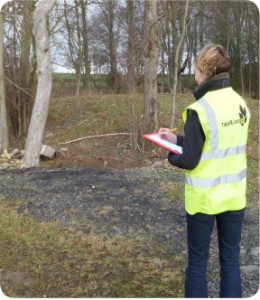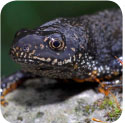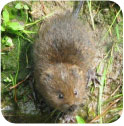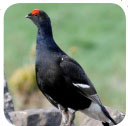An introduction
It is important that ecology is considered at an early stage in any development. Total Ecology carry out initial ecological scoping surveys, ecological risk assessments and protected species risk assessment surveys using the standard guidelines in order to identify potential opportunities and constraints at an early stage in the development process.
Procedure for carrying out a scoping survey
 The initial stage of a scoping survey is a site walkover using the standard extended Phase 1 survey guidelines. This is to produce a map of all the habitats on site, and identify any habitats that are of particular ecological importance. From this initial phase 1 survey work, each habitat is assessed for its potential to support protected and notable species. This may identify the need for further ecological surveys that are required to enable a smooth route through the planning process. A desk based study is also carried out, consulting with local record centres for protected/notable species records and designated sites within close proximity of the site.
The initial stage of a scoping survey is a site walkover using the standard extended Phase 1 survey guidelines. This is to produce a map of all the habitats on site, and identify any habitats that are of particular ecological importance. From this initial phase 1 survey work, each habitat is assessed for its potential to support protected and notable species. This may identify the need for further ecological surveys that are required to enable a smooth route through the planning process. A desk based study is also carried out, consulting with local record centres for protected/notable species records and designated sites within close proximity of the site.
Timing constraints
A scoping survey can be carried out at any time of year, although the optimal period for surveying habitats of particular interest is in the spring or summer months. It is important to identify any potential constraints early as certain species such as great crested newts and bats have a restricted survey season and can therefore hold up development unnecessarily, for up to 12 months, if they are not identified at an early stage in the process.
Potential protected species
Potential protected species issues include:
Great crested newts
 Ponds on site and within 500 metres will be assessed for their suitability using a habitat suitability index. This may highlight the need for full great crested newt surveys between mid March and mid June.
Ponds on site and within 500 metres will be assessed for their suitability using a habitat suitability index. This may highlight the need for full great crested newt surveys between mid March and mid June.
Bats
 Any structures on site will be assessed for their suitability as roosts and the site itself will be assessed for its importance as foraging habitat. This may result in the need for further risk assessments, nocturnal surveys and/or transect and static detector surveys.
Any structures on site will be assessed for their suitability as roosts and the site itself will be assessed for its importance as foraging habitat. This may result in the need for further risk assessments, nocturnal surveys and/or transect and static detector surveys.
Badgers
 The site and 30 metres outside the site will be checked for badger signs. If any signs are found then a full badger survey will be required.
The site and 30 metres outside the site will be checked for badger signs. If any signs are found then a full badger survey will be required.
Otters and water voles
 If any suitable watercourses or waterbodies are present on site these will be assessed for their suitability. If deemed suitable a dedicated otter and/or water vole survey will be required.
If any suitable watercourses or waterbodies are present on site these will be assessed for their suitability. If deemed suitable a dedicated otter and/or water vole survey will be required.
Birds
 The site will be assessed for its suitability for breeding and wintering birds. If deemed suitable a dedicated breeding bird and/or wintering bird survey will be required.
The site will be assessed for its suitability for breeding and wintering birds. If deemed suitable a dedicated breeding bird and/or wintering bird survey will be required.
Reptiles
 The site will be assessed for its suitability to provide suitable habitat for reptiles. If deemed suitable a dedicated reptile survey will be required.
The site will be assessed for its suitability to provide suitable habitat for reptiles. If deemed suitable a dedicated reptile survey will be required.
If there are no constraints identified by the habitat risk assessment survey then it is likely that no further surveys will be required.
Our ecologists have extensive experience in the standard Phase 1 survey methodology. We have provided phase 1 survey training for the IEEM and fellow ecological professionals and have carried out numerous ecological risk assessment and ecological scoping surveys.
Please contact us for further information and a no-obligation quotation, and one of our consultants will get straight back to you.